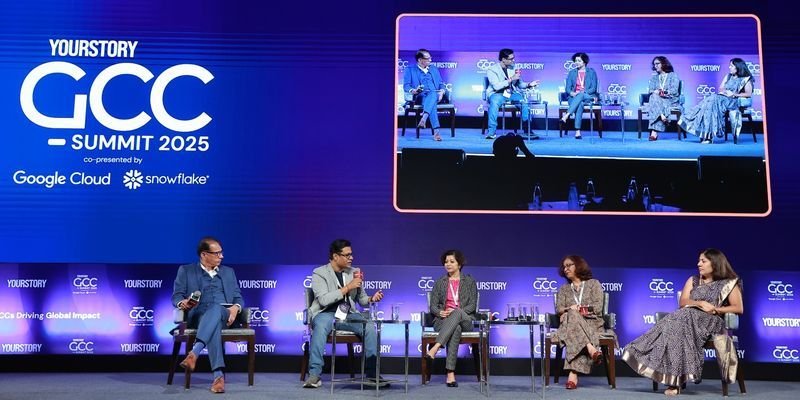
At a time when Global Capability Centres (GCCs) are becoming core innovation engines for enterprises worldwide, India is poised not just to participate—but to lead. In a panel discussion at the YourStory GCC Summit 2025, top industry experts explored what defines a “global tech leader” in the Indian GCC landscape, and what it will take to unlock the next phase of leadership and innovation.
Held on June 13, 2025, the session, titled ‘Next-gen global leaders: Made in India by GCCs’, brought together industry veterans, including Kaushik Das, Managing Director, JCPenney India; Kavita Tandon, Director HR, Snowflake; Monica S Pirgal, CEO, Bhartiya Converge; and Sunita Mohanty, President – Revenue, upGrad Enterprise. The session was moderated by Kamal Karanth, Co-founder, Xpheno.
What defines a global leader in the GCC context?
Monica S Pirgal challenged conventional assumptions about what it means to be in a “global” role. According to her, global leadership is not defined by geography, but by influence, accountability, and decision-making power. She introduced a framework—SOAR—to outline the qualities of a true global leader: S (Strategic influence at the global HQ), O (Ownership of global business outcomes), A (Authority and accountability for decisions), and R (Responsibility and a seat at the leadership table).
“Don’t get carried away by titles,” she said. “If you’re shaping strategy, driving global outcomes, and making decisions that matter—you are in a global role.”
Pirgal also noted that India is witnessing a surge in such roles. From around 6,500 global GCC leadership positions today, the number is expected to grow to 30,000 in the next five years. With these roles commanding salary premiums of 20–25%, the value being delivered is evident. “We’re not just in a stage of GCC evolution. The market is demanding a GCC revolution—and I believe we’re already there.”
Scope, not titles, define leadership
Kavita Tandon of Snowflake echoed similar sentiments. She highlighted that job descriptions and KPIs must reflect true global scope, not just global titles. “Do you lead P&L? Are you in the rooms where product or platform innovation is decided? Are you part of global governance?” she asked.
In her view, less than 20% of roles in mature GCCs truly meet that bar. Accountability, innovation, and global customer relationships must be embedded in the role for it to qualify as truly global.
India: The cradle for next-gen GCC leaders?
Moderator Kamal Karanth posed a critical question: Are we overstating India’s readiness to lead the next phase of GCC transformation? Kaushik Das of JCPenney India responded confidently: “It’s not an exaggeration. The impact Indian leadership has made in the GCC space is very real.”
Das argued that the future lies in integrating technology, product, and core business leadership to co-create innovation. “We can’t just be executing from India. Leaders here are increasingly driving business outcomes—and that’s how GCCs will truly come into their own.”
Who’s responsible for creating global leaders?
While individual effort and mentorship play a key role in leadership development, organisations must also step up. Sunita Mohanty of upGrad Enterprise cited a recent study showing that 90% of professionals expect their employers to invest in their learning journeys.
She called for organizations to enable holistic upskilling programs that reflect future-ready capabilities—analytical thinking, creativity, and emotional intelligence. “The next generation of leaders must lead with empathy and inclusivity, not just intelligence,” she noted, referencing a recent World Economic Forum report.
She also highlighted the importance of catering to generational diversity, a finding from upGrad Enterprise’s latest report, Skilling Smarter, that urges organizations to tailor their learning strategies to meet the needs of Gen Zs and Millennials.
Inclusivity as a foundation, not a checkbox
While DEI (Diversity, Equity & Inclusion) has become a buzzword in leadership conversations, its execution remains patchy. Karanth noted that only 9% of leadership hires in the last 2.5 years were women.
For Tandon, the conversation must begin with inclusion. “If we build inclusive cultures, diversity will be a natural outcome—not just a target.” Citing a Deloitte study, she added, “Companies that embed inclusion see 4.5x more success—because with inclusion come diverse ideas, perspectives, and innovation.”
The takeaway: Empower, upskill, and lead
As GCCs grow in scale and strategic importance, the panel agreed that structural changes are needed to unlock the next era of innovation. This includes linking KPIs to global outcomes, redefining leadership roles, and enabling Indian leaders to drive—not just deliver—global innovation.
In a world rapidly embracing AI, deeptech, and digital transformation, the next generation of global leaders is already being shaped in India’s GCCs. The evolution is over. The revolution is here.

